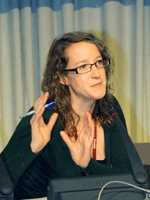Eurostep calls for a paradigm shift ahead of Rio+20
Published on Wed, 2011-06-22 07:40
Source: Eurostep Ahead of the UN Conference on Sustainable Development (UNSCD, or Rio+20) to be held in Rio in June next year, civil society organisations have described the official preparatory processes as being too slow and weak in content. If the conference is to live up to its commitment to achieving sustainable development, a fundamental paradigm shift in the global economic structure is needed, stated Eurostep this week. Any policy that is made within the current system that does represent such a paradigm shift will ultimately be unsuccessful, warned this network of autonomous European non-governmental development organisations based in Brussels. Progresses in the preparatory discussions have been slow, as “no global leaders have come forward with a compelling vision for the Summit, and it has received little press attention,” according to Hannah Stoddart, Policy Coordinator of the Stakeholder Forum for a Sustainable Future that operates as an interface between the international civil society and the UN. This lack of ambition may be explained by the general struggle of international actors to agree on multilateral accords, as was the case in the climate change conferences in Copenhagen and Cancún, the expert stated. These concerns have further gained in importance after the UN Commission on Sustainable Development failed to adopt an outcome document at its meeting in May 2011. In light of the international community’s failure to live up to its commitments on sustainable development there have been concerns among developing countries that developed countries may use the broad sustainability agenda of the conference to “rewrite and replace the sustainable development narrative”, including the ‘green economy’ concept “with an associated weaker emphasis on social concerns,” Stoddart warned. “Rio+20 takes place at a crossroads – the way in which humanity responds to the interconnected challenges of climate change, poverty and increasing natural resource scarcity in the coming decade will to a great extent determine the fate of future generations,” Stoddart continued. “Facing this daunting prospect, Rio+20 offers the opportunity to reinvigorate multilateralism under a more open and inclusive framework, and address the challenges of sustainable development in a 21st century context," she concluded. Voices have however grown louder, accusing the international community of predominantly focusing on environmental aspects of sustainability, lacking a sufficient focus on poverty alleviation and sustainable development, according to Eurostep. Moreover, current policy proposals for UNCSD do little to change the macroeconomic structures that leave millions in situations of chronic poverty. Any initiatives aimed at promoting sustainable development within these structures will ultimately be unsuccessful, since they fail to address the roots causes of poverty, added this network. That being said, UNCSD also represents an opportunity for such changes to be made, and for this reason Eurostep shall be monitoring the developments surrounding UNCSD and in particular the EU’s approach to sustainable development closely. |
SUSCRIBE TO OUR NEWSLETTER



